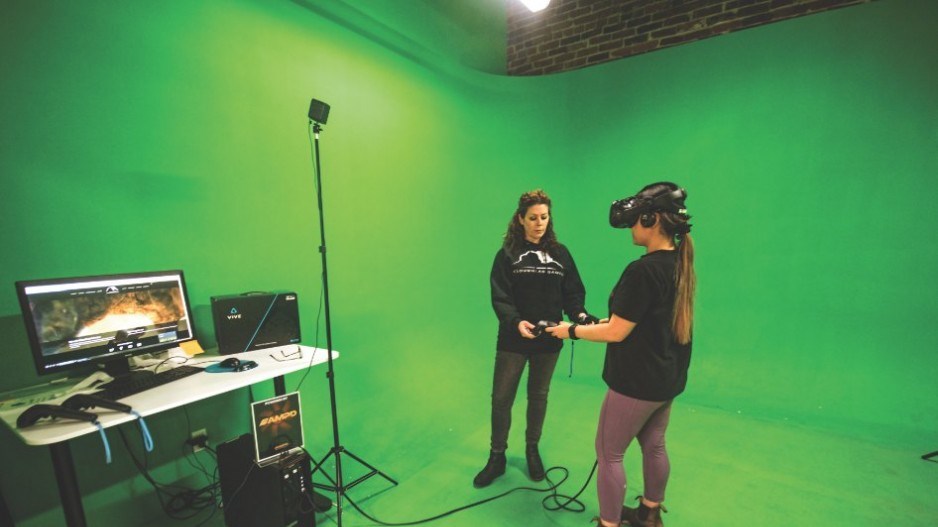When Capcom Game Studio Vancouver Inc. closed suddenly in September, 150 workers were left without jobs at what was then one of the stalwarts of the local gaming sector.
Many moved on very quickly, but not necessarily to another gaming studio, according to Dan Burgar.
“A lot of the talent from the VFX [visual effects] and gaming industries have translated over into building VR/AR [virtual reality/augmented reality] solutions and companies,” said the president of the Vancouver chapter of the VR/AR Association, which promotes the local virtual reality and augmented reality industry and facilitates collaboration among members.
The association estimates there are 230 firms in B.C. developing VR applications, up from about a dozen three years ago.
Burgar said the explosive growth has been bolstered by the province’s interactive digital media tax credit, Ottawa’s commitment of hundreds of millions of dollars to fund Canada’s Digital Technology Supercluster based in Vancouver, and the unique mix of gaming, visual effects and technology firms in B.C.’s largest city.
The explosive growth is also putting increased pressure on companies looking for qualified experts to work on these projects.
Microsoft Corp. (Nasdaq:MSFT) announced last fall it was partnering with the British Columbia Institute of Technology on a VR/AR curriculum. And the Vancouver Film School (VFS) launches an eight-month-long diploma program in April 2019.
While VFS is best known for training film industry workers, it also offers studies in creative technologies such as game design and digital design, which provide VR training within the curriculum.
VFS has been consulting with industry on its new program, which Mary Lim, the school’s manager of instructor training and program development, said would be notably different from previous VR training.
“The focus of our program is more along the lines of solving real-world problems in industry and in enterprise,” she said. “If a student wanted to create a game in VR, we would recommend that they go to the game-design program.… The students that come into this program, we’re hoping, will have a higher level of education and a higher level of critical thinking and just a desire to solve a real-world problem with this technology.”
The target size of the diploma program’s first cohort is 10 to 15 students, with a maximum capacity of 30.
“I think they’ll get snatched up quite quickly,” Lim said.
Meanwhile, other support hubs for the VR sector have been emerging throughout Vancouver.
Last month, startup incubator Launch Academy unveiled a 12,000-sqaure-foot VR centre in Gastown, which features a device lab and offers training programs, equipment rentals, workshops and mentorship opportunities for participants.
CEO Ray Walia told Business in Vancouver it’s drawing interest from entrepreneurs as far away as Mexico looking to set up a VR studio in the city and use the emerging VR ecosystem.
“I’d definitely love to see our students in the eight-month program end their time there [at Launch Academy] actually incubating a project there so that they get that experience,” said Lim, whose VFS campus is down the street from Launch Academy.
The BC Tech Association (BCTA) launched its own support hub, the Cube, 13 months ago.
It offers resources similar to Launch Academy, allowing early-stage companies to work in a physical space and collaborate whenever possible.
To date, more than 20 companies have used the 6,000-square-foot facility to develop VR applications.
Larger VR firms headquartered in other parts of the province have also moved into the Cube to establish a satellite office in Vancouver, according to Brian Roberts, the BCTA’s vice-president of strategy and execution.
“They’ve done that from a talent point of view, just to be able to attract both Vancouver talent and talent from outside the Lower Mainland,” he said.
Despite the competition for talent, the degree to which the companies have been collaborating under the same roof at the Cube has been surprising, said Theodora Jean, the BCTA’s director of strategic communications and policy.
“Everybody’s playing in a different space but they have so much to gain from … working collectively in the AR/VR industry as opposed to working against each other,” she said.
“There’s just such an appetite for AR/VR technology in general that there’s room for everyone.”
@reporton



